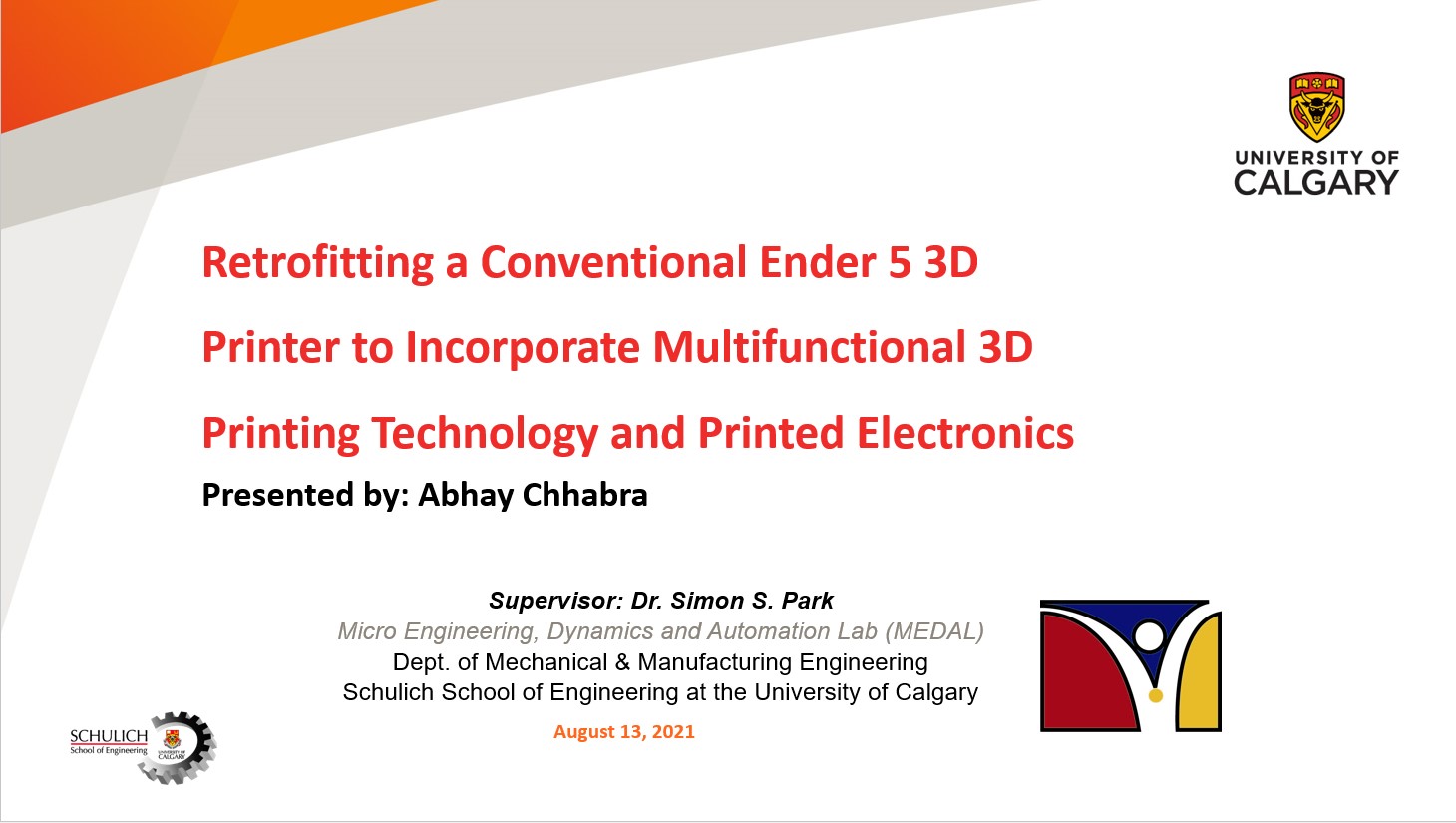Retrofitted 3D Printer Pellet Extruder Project
What? – Project Overview & Problem Statement
As part of my research at the Micro Engineering, Dynamics, and Automation Lab (MEDAL) at the University of Calgary, I worked on retrofitting a conventional Ender 5 3D printer to print directly with polymer pellets instead of filament.
Traditional 3D printers use filament, which is costly and requires additional processing since most plastics are originally manufactured as pellets. By developing a pellet extruder, the printer could:
- Lower material costs by skipping filament production.
- Expand material options (including conductive polymers and composites).
- Enable multifunctional 3D printing, with potential applications in printed electronics and sensors.
How? – Theory and Conceptualization
The retrofitting process involved mechanical, electrical, and software modifications to make the printer compatible with a pellet extruder.
- Extruder Setup: Started with a prototype and upgraded to a full-metal extruder system (aluminum and brass) for durability.
- Firmware & Control: Updated Marlin firmware, performed PID auto-tuning for stable heating, and adjusted motor controls for different melting points.
- Pellet Handling: Tested methods like freezer milling, ball milling, and cryogenic treatments to optimize pellet feeding.
- Electronics Integration: Added external DC motor and temperature controllers for precise regulation.
- Material Trials: Successfully extruded graphene-infused polycarbonate and polyethylene (PE) pellets.
- Circuit Development: Designed a voltage-drop sensing circuit with noise reduction (low-pass filter) for real-time resistance monitoring in conductive prints.
Results – Validation
- Proof of Concept: Demonstrated the ability to extrude and print directly with pellets, including conductive composites.
- Cost Benefits: Showed potential for significant material savings compared to filament printing.
- Prototype Prints: Produced cylindrical test blocks that revealed challenges with uneven heating and overflow.
Next Steps Identified:
- Replace DC motor with a gearbox stepper motor for precision.
- Add a dual-nozzle system for printing polymers and conductive inks together.
- Improve heating control for uniform extrusion quality.
Conclusion: This project proved that retrofitting a standard 3D printer for pellet-based, multifunctional printing is feasible, with clear advantages in cost and material flexibility. It also laid the foundation for future research in printing electronics and smart materials directly into 3D printed structures.
Key Mechanical & Engineering Concepts Applied
- Additive Manufacturing Principles: Compared filament vs. pellet-based printing in terms of cost, material availability, and process efficiency.
- Thermal Systems & Heat Transfer: Managed temperature control challenges in extrusion, including PID tuning and analyzing uneven heat distribution (conduction vs. convection).
- Mechanical Design: Modified and tested extruder hardware (moving from plastic parts to aluminum/brass) for better strength and wear resistance.
- Materials Engineering: Experimented with polymers and composites (polyethylene, graphene-infused polycarbonate) to evaluate their extrusion and printability.
- Mechatronics & Control Systems: Integrated external motor drivers, temperature controllers, and firmware updates to improve system precision.
Skills Learned from the Project
- Hands-On Prototyping: Built and retrofitted physical hardware for a functioning prototype.
- Troubleshooting & Iteration: Solved real-world challenges like motor skipping, pellet overflow, and uneven heating.
- Firmware & Controls Tuning: Gained experience in firmware modification (Marlin) and closed-loop temperature control (PID).
- Material Processing: Learned different methods for preparing and handling pellets for extrusion (cryogenic milling, ball milling).
- Interdisciplinary Collaboration: Combined knowledge from mechanical, electrical, and materials engineering to create a multifunctional system.
- Innovation & Research Thinking: Contributed to the foundation of 3D printing electronics and multifunctional structures, an emerging field in additive manufacturing.
